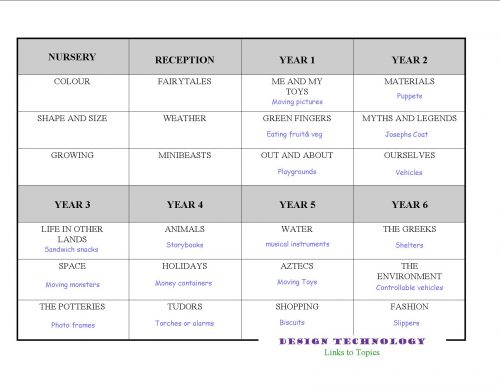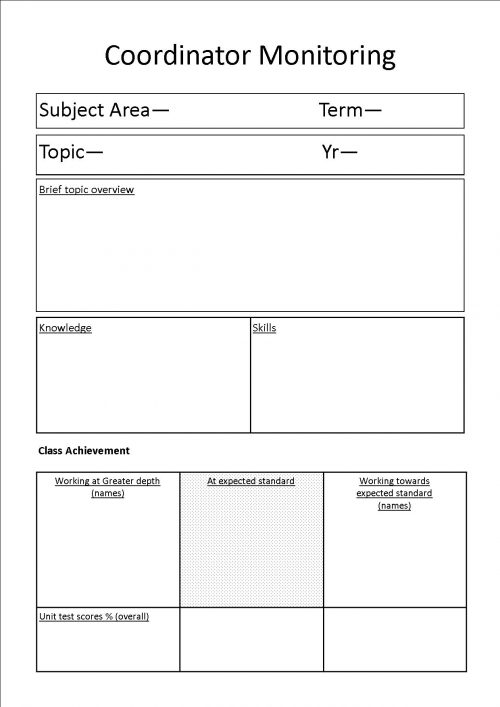With the current emphasis in the Primary curriculum on Maths and Literacy (and I predict Science very soon) it is all too easy for schools to push the other subjects – the foundation subjects to one side and to grant them less importance.
This is a direct result of the pressure being put on schools to deliver ever higher levels of both achievement and subject complexity in Maths and Literacy – directly leading to problems as we lose sight of a “broad and balanced curriculum” for our pupils.
OFSTED have picked up on the shift in schools and are now including a stronger element for the foundation subjects in their inspections……and in my opinion rightly so!
So how does this affect you – the foundation subject coordinator?
Well it puts you in the limelight when OFSTED visits – and should they ask to interview you then the HT will simply pass them your way….so make sure it’s not a hospital pass (as they say in Rugby and football)!
There are 2 very broad elements to your role as coordinator.
- Administration
- Management
Administration is the actual behind the scenes stuff that you do to keep the subject up and running. Things such as practical resources, literature, training courses, questionnaires to staff, keeping up to date with the curriculum and all the little things that are associated with your role.
Management: Now this is the one that will come into focus when OFSTED visit and its primarily this element that they will want to look into. (they may take a cursory glance at the admin but only in passing)

So what do OFSTED want to see and know about?
- The first thing that they want to see is that your subject is being taught in school – its a very simple start, but the question will be asked and you will have to show that yes it is and in classes for the required taught time.
- Now this brings us onto an important point….does your school have a balanced taught curriculum across all the subjects (or has this been lost or now not being tracked?) A balanced curriculum ENSURES pupils are taught the full range of subjects for appropriate lengths of time across a term – and of course this directly relates to you as coordinator. Do you know this is happening and for what lengths of planned time?
- Do teachers know how long they should be planning for each subject and is this shown on their timetable?……is the balance overseen by the SLT?
- At this point it may be useful for you to have copies of teachers timetables so that you know when your subject is being taught…..or even simply look at the master copies and jot down which class / which day and what times.
2. Once you know it is being taught and for the correct amount of time, the next thing you need to know is what is being taught!
- You don’t need to know much detail and a topic focus would be sufficient – but you must be aware that for example Year 2 in Geography are looking at different types of clouds (an example…this may not be true!)
- Put all this together so that you have a whole school view on 1 sheet – here’s an example for D/T. You can see the main class topic for each term and also the D/T focus for that topic.

3. Now this is the killer question for any Foundation subject coordinator – “how are the pupils achieving in your subject?”
- This can be even more focussed ” tell me about pupil achievement in Y3 in your subject for the Spring term?” Answer that without any data???
- So what do you need to have in place to be able to answer that or those types of question? There are 3 things that you need to show as evidence in your role of monitoring your subject – the first 2 are “additional evidence whilst the 3rd is directly what we need.
1. Class visits to observe lessons – now don’t make a big deal out of these because lesson observations and “drop ins” have become ridiculous in schools at the moment. However you do need to do this. I would aim to visit each class once in an academic year. Explain to your colleague that it’s not to observe them it’s just to see the subject “in action”….do a brief report for your file outlining what you saw – date it and that’s it. Purists would say that you need to give a copy of your report to the teacher also but as its quite informal I am sure they are not bothered!
2. Book monitoring or other evidence – depending on your subject there will either be books to look at or not….if your subject is more practical based then make sure you get to look at some of the work done by the children and perhaps take a few pics for your file (don’t forget to say which class and date). Book wise the usual practice is to look at a few higher / middle / and lower achievers. How often you do this is really up to you – you could even look at highers one term …middle another term and lower achievers in the final term. (don’t forget to make a quick report on what you have seen and identify the class and date it)
3. This is my opinion is the decider and answers the question about achievement in 1 hit – but it needs to run in conjunction with the other 2 to get the full picture. This is the Teacher / coordinator conversation (it’s really a report doc). This is to be completed by the teacher at the end of the unit of work in your subject – this may be termly or even 1/2 termly. It is a sheet that the teacher completes that summarises the unit of work and how the pupils have achieved. Take a look at an example below
 You can see in the above example that the teacher completes the basic parameters of the subject topic. What is going to be done and what are the prime knowledge and skill elements that will be covered and learnt. Having completed the topic the class achievement part of the form is completed and this will vary from subject to subject.
You can see in the above example that the teacher completes the basic parameters of the subject topic. What is going to be done and what are the prime knowledge and skill elements that will be covered and learnt. Having completed the topic the class achievement part of the form is completed and this will vary from subject to subject.
The larger boxes dealing with standards will be completed from evidence that the teacher has collected over the period of the topic – this might be written, practical, observed …in combination the teacher will make an assessment of what level of achievement has been reached by the individual pupils. You will notice that the “at expected” standard box is shaded – there is no need to add names to this box – by completing the “towards” and “greater depth” boxes it automatically places the other children in the class into this “working at” level.
The final box will suit foundation subjects where a short written test can be given at the end of the unit covered. In conversation with colleagues you can decide what scoring bands (8-10 / 5-7 / below 5 …for example) would be appropriate for each level and then a simple % of pupil numbers achieving that level would be given.
This summary document is then collected by you as coordinator and you now have an overview of not only the units covered and their content but also on just how they achieved in the professional opinion of the teachers.
(The example given is only my idea for this document and I am sure you could design your own if necessary to cater for any other aspects you may wish to record)
In my opinion the combination of information outlined above (observations / book or work scrutiny and teacher unit feedback) will give you sufficient information to answer any questions that you may be asked by OFSTED. It will also allow you to plan ahead for successful delivery and progress of your subject in the future.
If you wish either of the sheets shown please contact me either through facebook or email charleswatson@primarypractice.co.uk
Charles


